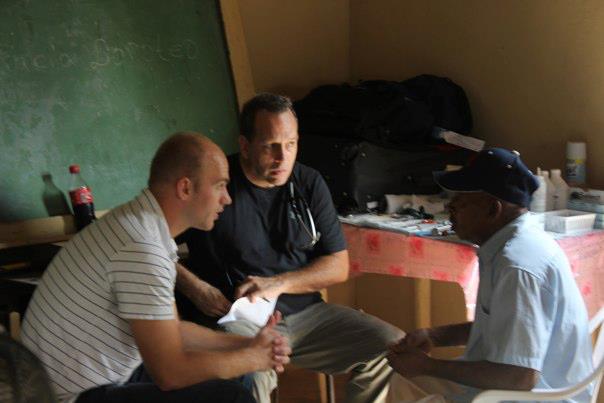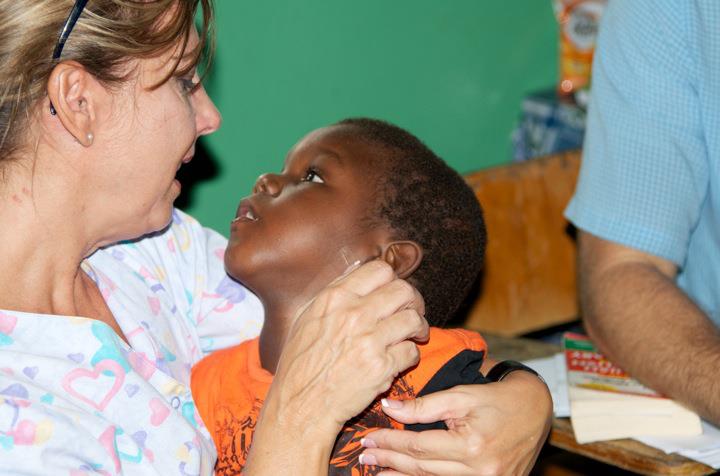
Aaron Roth – HOPE International – November 2011
Fifteen minutes prior, a downpour filled up the roads in the area, and it was still raining when we crossed through the final puddle to get to the school where we’ve made a loan to fund new classrooms and computer labs. The water came to halfway up the tire on the motorcycle taxi I was riding. I picked up my feet just to pretend I was being wise, knowing that my shoes were already wet. I walked in at 10 minutes after 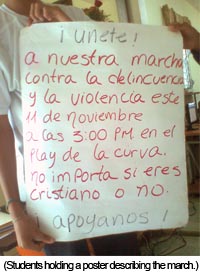 two o’clock. The director greeted me. Two hundred students were missing from school that afternoon. “Maybe it’s the rain?” I asked. The director responded, “Maybe, but there’d at least be a few.” “Well maybe there’s an event going on that we don’t know about?” That was just a wild guess, I don’t know the local community news.
two o’clock. The director greeted me. Two hundred students were missing from school that afternoon. “Maybe it’s the rain?” I asked. The director responded, “Maybe, but there’d at least be a few.” “Well maybe there’s an event going on that we don’t know about?” That was just a wild guess, I don’t know the local community news.
I arrived here to work on a project in our micro-lending program that helps improve the quality of education for schools in the rural area. As we were sitting down chatting, a young man walks in the door holding a huge sign about a march against violence and crime in the sector where we are currently located. He tells us that every student from just about every school is probably at the afternoon event which is to start in about 30 min. They won’t be coming in this afternoon.
“So the violence is pretty bad in this area huh?” I ask.
“Yeah, especially when the really poor people try to steal from other people. You know, it gets really bad when people don’t have much.”
Generally, it gets a lot more dangerous in this country around Christmas time. It may sound odd that a time when Christmas cheer should prevail throughout the land, it’s actually quite the opposite. I’ve heard of at least two reasons for the increased danger in the holiday season:
1) By Dominican law, all employees public or private should receive a double salary in December. So, there’s generally more money moving around in the economy, and therefore more targets for theft and robbery.
2) Everyone wants to provide gifts for their family and make purchases during holiday discounts, or at least to have something to give their children. (Christmas time here is the only time most people make non-essential purchases.) Lack of economic resources encourages some people to rob, steal, or prostitute themselves to get more income for Christmas.
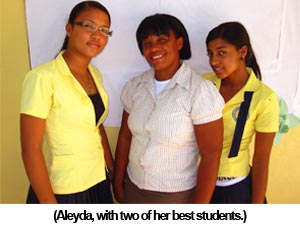 The director, Aleyda Torres, follows up with a comment that while the students are missing this afternoon that some students haven’t been coming to school for the past two months. “Why?” Their parents don’t have the money for tuition. They are waiting until they get paid double in December and the students will come back to school.”
The director, Aleyda Torres, follows up with a comment that while the students are missing this afternoon that some students haven’t been coming to school for the past two months. “Why?” Their parents don’t have the money for tuition. They are waiting until they get paid double in December and the students will come back to school.”
I wanted to launch into a discussion about the economic realities faced by the inhabitants of this local area, but Aleyda interrupts me. She looks at my shoes. She sees that they’re wet. I told her it doesn’t bother me. It does, but given this current situation, it feels trite to mention it. She’s looking me over and something strikes her, she says, “Wait, have you eaten lunch?” I respond no. She asks one of the teachers to make me some food, ASAP. Her change of focus tells me that a woman like this, living in such a difficult area, focuses on the immediate practical responses she can take and less on moping about the rain or lack of students. How many of us would focus on whether one person had eaten when they are missing over 200 students?
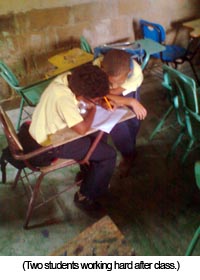 Aleyda begins to tell me about her great journey walking with the Lord and how he’s provided for her in the most difficult of times. To her, this downpour isn’t a big deal. In fact, her school has survived a hurricane in its history. The Lord brought tarps and teams of people to rebuild. She moves onto talking about what it’s like to be in charge of 440 students. She talks about wanting to exchange the tendencies to violence for more productive activities like music, sports, and studies. “Only the Lord can really change the heart of these students, you know?” She relies on the wisdom of the Lord and imparts this verse to her students frequently. “I like to keep Proverbs 3: 5-6 in mind when I talk to our students about making decisions:”
Aleyda begins to tell me about her great journey walking with the Lord and how he’s provided for her in the most difficult of times. To her, this downpour isn’t a big deal. In fact, her school has survived a hurricane in its history. The Lord brought tarps and teams of people to rebuild. She moves onto talking about what it’s like to be in charge of 440 students. She talks about wanting to exchange the tendencies to violence for more productive activities like music, sports, and studies. “Only the Lord can really change the heart of these students, you know?” She relies on the wisdom of the Lord and imparts this verse to her students frequently. “I like to keep Proverbs 3: 5-6 in mind when I talk to our students about making decisions:”
“Trust in the LORD with all your heart and lean not on your own understanding;
in all your ways submit to him, and he will make your paths straight.”
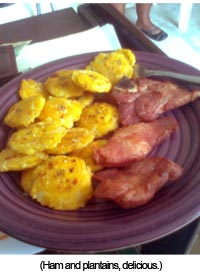 Aleyda has built her foundation on a solid rock in such a shaky place like this. With the violence and unrest in a poor neighborhood, the tremendous downpours, the lack of government assistance in the schools, and not to mention trying to keep order in a school of 440 kids, she’s got a lot on her mind. But somehow she is at peace. She’s more concerned with the immediate, she checks again to see where we are with the food.
Aleyda has built her foundation on a solid rock in such a shaky place like this. With the violence and unrest in a poor neighborhood, the tremendous downpours, the lack of government assistance in the schools, and not to mention trying to keep order in a school of 440 kids, she’s got a lot on her mind. But somehow she is at peace. She’s more concerned with the immediate, she checks again to see where we are with the food.
The fried plantains and ham come out. It’s been six hours since I’ve eaten and this hot food warms me up. I realize my feet are still wet because of that “river” we rode through to get here. I make a practical decision. I’ll change into my sandals when I get to the bus. (Yes, I still wear sandals here in November.) I feel better mentally.
Aleyda gets up to help someone use the computer lab. Oh, I forgot to mention this, she used part of her loan to create a computer lab for her high school and when it’s not in use it becomes an internet center in the community. People can come use the computers here for about 50 cents an hour. The money she makes from the lab pays her monthly loan 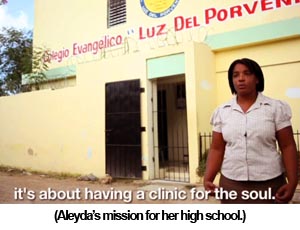 amount. She is, by all sense of the words, an entrepreneur and a dynamo.
amount. She is, by all sense of the words, an entrepreneur and a dynamo.
I finish the meal and we chat for a bit longer. The rain stops. It’s time for me to go.
“Vaya con Dios,” she tells me. “Go with God” is a common phrase to say goodbye in Spanish, but I believe that in her case, she speaks from experience; a personal history, a relationship with the Lord that has walked with her through 16 years and a daily journey with 440 students, hurricanes and rainy afternoons, in the second-poorest community in her city. He’s straightened even the most windy, rocky, muddy roads in her life and left her with enough peace and energy to make sure a tired, soaked, traveler gets a meal at 2:30 in the afternoon.
I hope you are enjoying the Christmas season and that your roads are getting easier to travel as we get closer to Christmas.
Blessings to you and your family,
-Aaron
aroth@hopeinternational.org
www.AaronRoth.net
Skype: aprothwm05
————————————————————————————————
*Update: I have been writing “thank you” letters to you all from the Dominican Republic for this past year. I hope you get yours in time for Christmas.
I’ll be sending an email about coming back to the Dominican Republic in January in a few weeks. Do pray for the work of HOPE and if you feel led to support me financially, you can find that information here.

 HOPE International’s internship and fellowship opportunities are designed for individuals seeking to develop spiritually and professionally, while gaining valuable experience. HOPE interns and fellows enjoy the benefits of a challenging and meaningful opportunity, while working in a spiritually nurturing environment. During this opportunity, you will experience spiritual formation, professional enrichment, and significant involvement.
HOPE International’s internship and fellowship opportunities are designed for individuals seeking to develop spiritually and professionally, while gaining valuable experience. HOPE interns and fellows enjoy the benefits of a challenging and meaningful opportunity, while working in a spiritually nurturing environment. During this opportunity, you will experience spiritual formation, professional enrichment, and significant involvement.


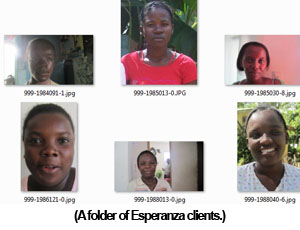 So, as I was working on this project last week I was thinking about these people that we serve; and I was doing it rapidly. With the new launch of Esperanza’s web site:
So, as I was working on this project last week I was thinking about these people that we serve; and I was doing it rapidly. With the new launch of Esperanza’s web site: 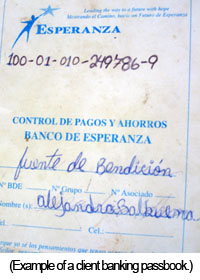 “Well, it usually means they emigrated here from Haiti.”
“Well, it usually means they emigrated here from Haiti.”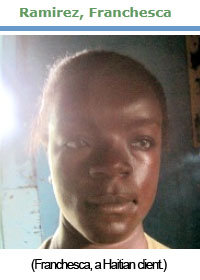 Her name is Franchesca Ramirez and she is a member of the community banking group called Bendiciones de Dios (Blessings from God). She’s my age, married, and has two children. Her microloan was for $160 dollars over six months for her small business of selling clothing in her local community. Immediately, a story fills in the details of her life, much like that light in the background fills up the room where she sits.
Her name is Franchesca Ramirez and she is a member of the community banking group called Bendiciones de Dios (Blessings from God). She’s my age, married, and has two children. Her microloan was for $160 dollars over six months for her small business of selling clothing in her local community. Immediately, a story fills in the details of her life, much like that light in the background fills up the room where she sits.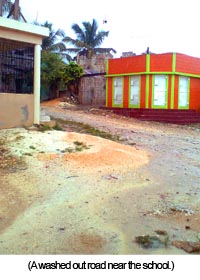
 two o’clock. The director greeted me. Two hundred students were missing from school that afternoon. “Maybe it’s the rain?” I asked. The director responded, “Maybe, but there’d at least be a few.” “Well maybe there’s an event going on that we don’t know about?” That was just a wild guess, I don’t know the local community news.
two o’clock. The director greeted me. Two hundred students were missing from school that afternoon. “Maybe it’s the rain?” I asked. The director responded, “Maybe, but there’d at least be a few.” “Well maybe there’s an event going on that we don’t know about?” That was just a wild guess, I don’t know the local community news. The director, Aleyda Torres, follows up with a comment that while the students are missing this afternoon that some students haven’t been coming to school for the past two months. “Why?” Their parents don’t have the money for tuition. They are waiting until they get paid double in December and the students will come back to school.”
The director, Aleyda Torres, follows up with a comment that while the students are missing this afternoon that some students haven’t been coming to school for the past two months. “Why?” Their parents don’t have the money for tuition. They are waiting until they get paid double in December and the students will come back to school.” Aleyda begins to tell me about her great journey walking with the Lord and how he’s provided for her in the most difficult of times. To her, this downpour isn’t a big deal. In fact, her school has survived a hurricane in its history. The Lord brought tarps and teams of people to rebuild. She moves onto talking about what it’s like to be in charge of 440 students. She talks about wanting to exchange the tendencies to violence for more productive activities like music, sports, and studies. “Only the Lord can really change the heart of these students, you know?” She relies on the wisdom of the Lord and imparts this verse to her students frequently. “I like to keep Proverbs 3: 5-6 in mind when I talk to our students about making decisions:”
Aleyda begins to tell me about her great journey walking with the Lord and how he’s provided for her in the most difficult of times. To her, this downpour isn’t a big deal. In fact, her school has survived a hurricane in its history. The Lord brought tarps and teams of people to rebuild. She moves onto talking about what it’s like to be in charge of 440 students. She talks about wanting to exchange the tendencies to violence for more productive activities like music, sports, and studies. “Only the Lord can really change the heart of these students, you know?” She relies on the wisdom of the Lord and imparts this verse to her students frequently. “I like to keep Proverbs 3: 5-6 in mind when I talk to our students about making decisions:” Aleyda has built her foundation on a solid rock in such a shaky place like this. With the violence and unrest in a poor neighborhood, the tremendous downpours, the lack of government assistance in the schools, and not to mention trying to keep order in a school of 440 kids, she’s got a lot on her mind. But somehow she is at peace. She’s more concerned with the immediate, she checks again to see where we are with the food.
Aleyda has built her foundation on a solid rock in such a shaky place like this. With the violence and unrest in a poor neighborhood, the tremendous downpours, the lack of government assistance in the schools, and not to mention trying to keep order in a school of 440 kids, she’s got a lot on her mind. But somehow she is at peace. She’s more concerned with the immediate, she checks again to see where we are with the food. amount. She is, by all sense of the words, an entrepreneur and a dynamo.
amount. She is, by all sense of the words, an entrepreneur and a dynamo.
 This particular case with the man mentioned above was like many of the 115 patients we saw that day and the 110 the day prior. Most of the patients had significant pain in their stomach and were unable to eat well, or if at all. It was the hardest thing to look into the eyes of a child when he says to you “My tummy hurts.” And he rubs his stomach trying to make it better. Doctor VanLue’s reassurance was comforting, and we were able to give every family that walked through the door the medicine to kill the parasites, and spent time talking with them about proper food preparation and the importance of clean water.
This particular case with the man mentioned above was like many of the 115 patients we saw that day and the 110 the day prior. Most of the patients had significant pain in their stomach and were unable to eat well, or if at all. It was the hardest thing to look into the eyes of a child when he says to you “My tummy hurts.” And he rubs his stomach trying to make it better. Doctor VanLue’s reassurance was comforting, and we were able to give every family that walked through the door the medicine to kill the parasites, and spent time talking with them about proper food preparation and the importance of clean water. She’s been a microfinance client for six years. She and her husband run a successful business selling fruit to the local community. He’s currently working the double-shift so she can take children to the clinic that we brought into the mountains. I guess I’m taken aback at this situation. Normally, if I would have seen this woman during a microfinance meeting it’s all business, smiles, and a few prayer requests, much like a weekly small group Bible Study meeting. But its different now, she’s let me in to her life because I’m the doctor for the day. She tells me that two of her daughters may have Sickle Cell Anemia, a red blood cell deficiency that can be deadly later on in life. Doctor VanLue tells me that this is difficult to treat in the States, hopefully they just have Anemia, which is a much less dangerous illness caused by poor nutrition.
She’s been a microfinance client for six years. She and her husband run a successful business selling fruit to the local community. He’s currently working the double-shift so she can take children to the clinic that we brought into the mountains. I guess I’m taken aback at this situation. Normally, if I would have seen this woman during a microfinance meeting it’s all business, smiles, and a few prayer requests, much like a weekly small group Bible Study meeting. But its different now, she’s let me in to her life because I’m the doctor for the day. She tells me that two of her daughters may have Sickle Cell Anemia, a red blood cell deficiency that can be deadly later on in life. Doctor VanLue tells me that this is difficult to treat in the States, hopefully they just have Anemia, which is a much less dangerous illness caused by poor nutrition. The mom of seven looks at me and knows that my countenance has changed, she asks me what’s wrong. I tell her that it’s raining and I want it to stop so that we can see everyone who came here. I don’t want our team to be in danger trying to leave the mountains. She reassures me, “Doctor, it’s the Lord that brought the clinic to us today, and it’s the Lord that’ll take you back home.”
The mom of seven looks at me and knows that my countenance has changed, she asks me what’s wrong. I tell her that it’s raining and I want it to stop so that we can see everyone who came here. I don’t want our team to be in danger trying to leave the mountains. She reassures me, “Doctor, it’s the Lord that brought the clinic to us today, and it’s the Lord that’ll take you back home.” It all strikes me at the same time. The two daughters with Anemia. The pounding rain on the roof. The women with their children waiting to see us. The muddy roads getting muddier. The smiles on the Doctor’s face and the rest of the family we just visited. The real doctor is thanking the patient for her visit. Wow. I’m amazed and inspired. It’s people like Doctor Scott VanLue, and women like the one we just visited that renew my vision for what this world can be, a world where the living God still moves and works where we think it’s hopeless.
It all strikes me at the same time. The two daughters with Anemia. The pounding rain on the roof. The women with their children waiting to see us. The muddy roads getting muddier. The smiles on the Doctor’s face and the rest of the family we just visited. The real doctor is thanking the patient for her visit. Wow. I’m amazed and inspired. It’s people like Doctor Scott VanLue, and women like the one we just visited that renew my vision for what this world can be, a world where the living God still moves and works where we think it’s hopeless.